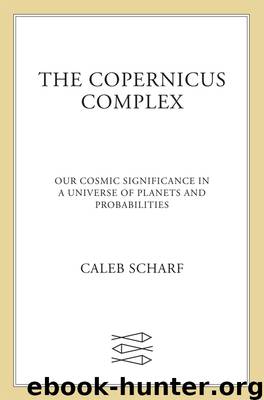The Copernicus Complex by Caleb Scharf

Author:Caleb Scharf
Language: eng
Format: epub
ISBN: 9780374709464
Publisher: Farrar, Straus and Giroux
6
HUNTERS OF THE COSMIC PLAIN
If I had to name two traits that accurately and optimistically sum up the human species, I’d put my money on imagination and restlessness. The signs are everywhere. Take, for example, the ways in which we’ve expressed our fascination and vexation over our cosmic status. Artifacts and expressive records of our observations and imaginings from a thousand, five thousand, even twenty thousand years ago reveal intense cogitation. Although anthropologists continue to debate the motives behind the most ancient cave paintings and sculptural forms, one of the most plausible theories to me is that they reflect an effort by early modern humans to analyze their universe of animals, landscapes, and rituals. It might be tempting to believe that these illustrations or objects were simply idle doodling and fiddling to while away a boring winter, but even if that’s so, I can’t help but feel that there was something conscious and deliberate going on—perhaps a sorting and sifting of facts and observations that had not quite coalesced into a rational picture of the world. And this behavior didn’t happen once; it continued from generation to generation. Some of the more abstract of these ancient images and figurines dwell on strange representations of human-animal hybrids, Earth mothers (possibly deities), and monsters. It is the stuff of feverish dreams. Here’s the human mind working desperately, trying to fill gaping voids in knowledge, and to understand the Meaning of Life. If we need to invoke unseen beings and forces to make sense of it all, then so be it.
The same has been true of our struggles to map the relationship of the heavens to the Earth, the Sun, and the Moon, often connecting the planets and constellations to gods and fantastical creatures in an attempt to provide explanations for the patterns we saw. The nature of time has also been perplexing—to our ancestors as they studied their surroundings, and still to humans of the twenty-first century as we theorize about the nature of the universe. On all physical scales the cosmos embraces change, clearly moving along to leave the old and weak behind, and to weather rock and rot and decay the husks of living things. We also observe and record great regimes of repeating seasonal change, lunar cycles, and the slow pulse of climatic variations. What goes around comes around. Witnessing the cycles of biological life, we have extrapolated to invent the notion of endless cosmic repetition and rebirth, concepts that span human cultures and generations.
This creative hubbub of drawing, mapping, and timekeeping has at its core a thirst for cosmic clarity. And again and again we arrive at the question of whether or not anyone else is “out there,” in space or time. Yet one can easily argue that there has never been any data at all on the presence or absence of other life in the cosmos. I don’t want to make this sound too depressing, but it’s true—which is why we’re lucky we’ve discovered beer and chocolate to console ourselves.
Download
This site does not store any files on its server. We only index and link to content provided by other sites. Please contact the content providers to delete copyright contents if any and email us, we'll remove relevant links or contents immediately.
| Aeronautics & Astronautics | Astronomy |
| Astrophysics & Space Science | Comets, Meteors & Asteroids |
| Cosmology | Mars |
| Solar System | Star-Gazing |
| Telescopes | UFOs |
Tools of Titans by Timothy Ferriss(8346)
Turbulence by E. J. Noyes(8001)
Secrets of Antigravity Propulsion: Tesla, UFOs, and Classified Aerospace Technology by Ph.D. Paul A. Laviolette(5356)
Astrophysics for People in a Hurry by Neil DeGrasse Tyson(5168)
Room 212 by Kate Stewart(5089)
Design of Trajectory Optimization Approach for Space Maneuver Vehicle Skip Entry Problems by Runqi Chai & Al Savvaris & Antonios Tsourdos & Senchun Chai(5052)
Pale Blue Dot by Carl Sagan(4981)
The David Icke Guide to the Global Conspiracy (and how to end it) by David Icke(4682)
A Journey Through Divination and Astronomy by Publishing Pottermore(4369)
Goodbye Paradise(3790)
Apollo 8 by Jeffrey Kluger(3688)
COSMOS by Carl Sagan(3602)
The Five People You Meet in Heaven by Mitch Albom(3544)
Losing the Nobel Prize by Brian Keating(3526)
How to Read Water: Clues and Patterns from Puddles to the Sea (Natural Navigation) by Tristan Gooley(3443)
Brief Answers to the Big Questions by Stephen Hawking(3408)
How to Read Nature by Tristan Gooley(3313)
The Order of Time by Carlo Rovelli(3173)
A Brief History of Time by Stephen Hawking(3007)
